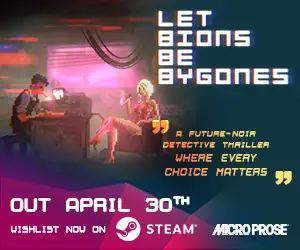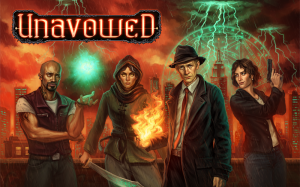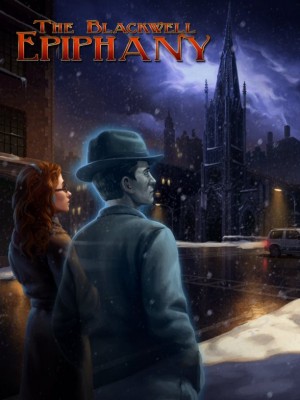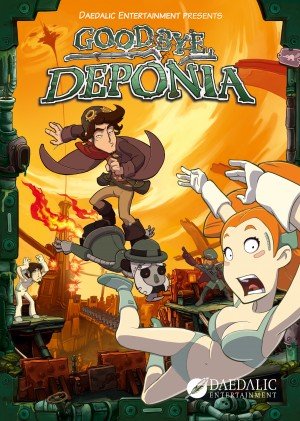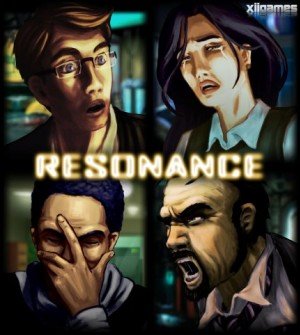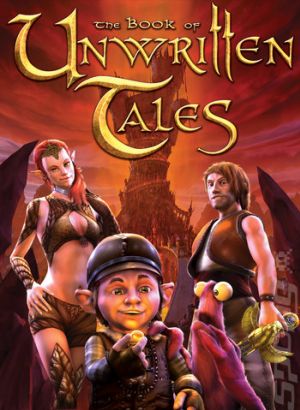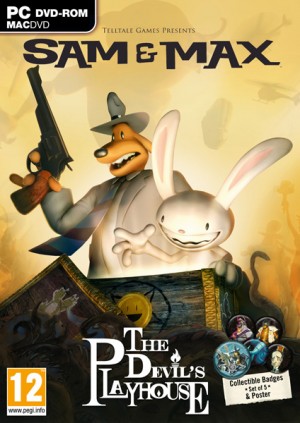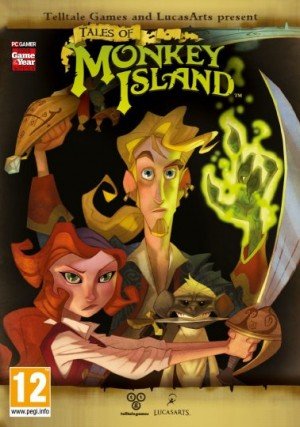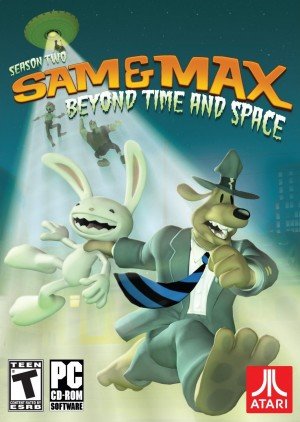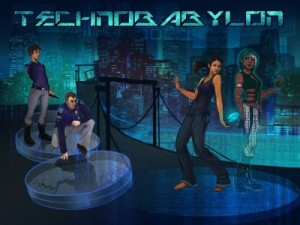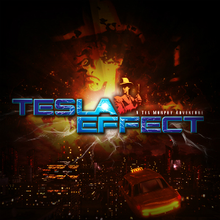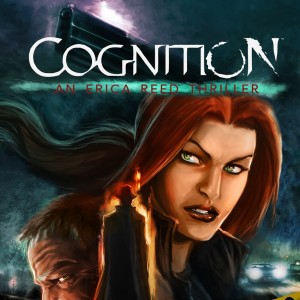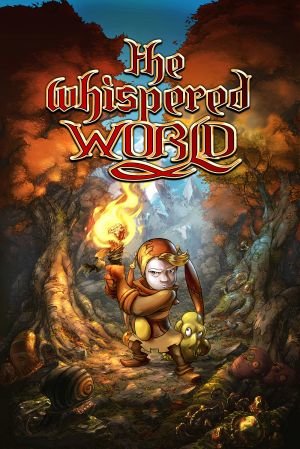Best Traditional AdventureAggie Award Winners

Why mess with a good thing? While innovative adventures provide a welcome breath of fresh air, the lifeblood of the genre continues to be the many games that closely adhere to the comfortable, tried-and-true design formulas. Full of inventory and/or logic puzzles, memorable character dialogue, epic storylines and immersive exploration, they may not have changed much since Monkey Island and Myst – or even the original Zork for some – but they’re no less enjoyable when done well. Note: The winner of your Best Adventure Aggie should also win either Best Non-Traditional or Best Traditional adventure. These two sub-categories are not intended solely for runner-ups to the grand prize.
» Aggie Awards - category overview
The Aggie award winners:
Röki (2020 winner)
It only takes a few moments playing Polygon Treehouse’s Scandinavian folklore adventure Röki to know you’re in for something truly special. Though the game starts off grounded in the real world at the Jakobsen home that the young protagonist Tove shares with her father and younger brother Lars, it isn’t long before things take a turn for the fantastical. After their house is ransacked in the middle of the night by a towering, ebony-furred creature, Tove and Lars escape into the foreboding midnight woods, only to be separated in the end and teleported to a whole new world.
Lovely it may be, but this realm is also home to a host of imaginative creatures – some friendly, some less so – straight from the children’s stories Tove used to read to her brother each night. Each screen hides new discoveries to be made, each encounter an opportunity to come one step closer to finding Lars in this fairy tale forest. There’s a great sense of progression, with puzzles being neither too simple nor too convoluted, challenging without being frustrating, and every major section has its own setting and narrative feel. A clean art style, lovely soundtrack featuring traditional native instrumentation, and charming character vocalizations further underscore the game as an incredibly enjoyable experience. When the credits finally roll after a substantial-feeling ten or so hours, they bring a great sense of closure to a fulfilling journey through this snowy realm of Scandinavian fantasy.
Though it didn’t earn an AG staff nod in any one particular area of expertise, it certainly wasn’t for lack of quality, as overall Röki is the complete package in every respect. It’s a lovely experience from start to finish, and an expertly crafted sojourn that satisfies that sense of childlike curiosity within all of us. It stole our hearts with its endearing charm and earned its rightful place as the winner of our Best Traditional Adventure Aggie.
2020 winner of:
2020 Readers Choice' winner of:
Whispers of a Machine (2019 winner)
For a game that is able to consistently impress across the board, look no further than Whispers of a Machine. We had to check twice to make sure this wasn’t a new Wadjet Eye title, but no, this is a joint tech-noir design effort between Clifftop Games (Kathy Rain) and Faravid Interactive (The Samaritan Paradox) that shares many of the same admirable qualities. Offering up a well-written murder mystery set in a spellbinding future world that’s been to the brink of the machine apocalypse and back, the story is able to deliver a host of intriguing conflicts revolving around the thin line separating the natural and artificial, all completely ancillary to the main narrative.
Not to be outdone, the gameplay sets itself apart by innovating upon the conventional point-and-click formula while still retaining the tried and true mechanics we’ve come to know and love – no small feat. Through the use of nanotech augmentations, detective Vera Englund evolves over the course of the adventure, unlocking previously dormant abilities that aid her in the investigation. These enhancements are significant, as the acquired powers depend on various player choices and can be different on repeat playthroughs, requiring new approaches to puzzles and even opening or closing off specific options entirely. Great voicework, an effective score, and polished pixel visuals round out a highly commendable package that deserves to be experienced by any adventure fan, and one we’re happy to award the title of Best Traditional Adventure of 2019.
2019 winner of:
2019 Readers Choice' winner of:
Unavowed (2018 winner)
Although it’s not a requirement that our Best Traditional Adventure winner feature point-and-click gameplay and retro-styled pixel art, a game certainly doesn’t get more nostalgic-feeling than that. Yet Wadjet Eye’s Unavowed is not just an ordinary old-school throwback, it’s an extraordinary modern day iteration of everything we’ve come to know and love about the genre, with an art design that would be at home alongside the LucasArts classics, an excellent musical score, superb characters and voice acting, and an in-depth, twisting story throughout. You even get to name your character like in some of the old Sierra games.
Beyond its mechanics, which are refined, and the production values, which are high, here is a game that gets all the other things right as well. This urban fantasy’s New York setting feels thoroughly authentic, which helps ground all of the supernatural events taking place within the city. Here you join a team of mystically talented misfits to police these otherworldly activities even while surrounded by familiar signs of everyday life. Through circumstances and puzzles that change depending on which partners you choose to bring along, you can learn as much or as little about your colleagues as you like, as each comes with their own background and distinct personality. Throw in a surprise twist in the narrative and Unavowed will keep you enchanted from beginning to end… and then back to the beginning to replay what you missed thanks to the inclusion of mild role-playing elements that deepen the experience even further.
2018 winner of:
Thimbleweed Park (2017 winner)
Thimbleweed Park
In case you’ve been stuck in a mansion of maniacs for the past 30 years, you probably already know that Thimbleweed Park (the game) is the creation of genre legends Ron Gilbert and Gary Winnick, a hilarious riff on classic adventures that takes quirkiness to an all-new level. Set in Thimbleweed Park (the village), a decidedly offbeat outpost in the American heartland that has seen better days, this is about as “traditional” as an adventure game gets. Not only does it resurrect the point-and-click SCUMM interface the two developers co-created decades ago, it presents a host of character-swapping, head-scratching puzzles to solve and wraps it in a foot-tapping, gloriously retro-styled aesthetic – although one modernized for today’s hi-definition displays.
Like its forebear, Thimbleweed Park doesn’t have just one or two playable protagonists but a whopping FIVE, each with their own distinct personality, including a pair of investigators with hidden agendas, a bespectacled geek determined to be a game developer, an out-of-his-element ghost, and Ransome the rough-edged, fluently-[beeping] clown. And that’s just the ones you play. The town itself is home to a rapidly decreasing population of oddballs, many of them amusingly disguised: Groucho Marx glasses mask many a stealthy face, a young man poses as a slice of pizza, and the plumbers are dressed like pigeons. At ThimbleCon ’87 (a “Nerd and Geek Convention”) we’re introduced to a baby Batman and wannabe Star Trek groupies, and even Ron Gilbert showing off his victory dance moves. One particularly mysterious character tries to conceal his identity through local yokel verbal tics. The humorous writing ensures an ongoing source of chuckle-inducing banter, and the voice-overs are superbly suited to this eclectic cast of misfits.
Full of deep perspective and intricate detail, the landscapes feature a sumptuous color palette, from vivid neon to gorgeous pastel sunset tones, and simple animations keep the world lively. Whimsical elements add personality: the smiley-face stain on the bathroom mirror, the Albert Einstein poster in Delores’s room, the hotel’s bizarre cowgirl-with-a-headless-swamp-creature fountain, and many more. The background score, meanwhile, ranges from southern-noir guitar to jaunty carnival tunes, often seamlessly transitioning between styles.
Interactions take place via vintage LucasArts-style verbs at the bottom of the screen. Corporeal characters can Open, Look at, Talk to, and Push, but Franklin the ghost is able to Moan, Chill, Blow on, and Zap. Many of the puzzles have multiple steps, and clever challenges include filling up the various Tron machines with highly processed inventory goodies, insulting a circus audience, making sure certain people contract food poisoning, getting into a mad inventor’s crypt, and picking up pixel dust. Okay, the latter isn’t exactly a puzzle, but it is strangely satisfying. The unapologetically old-school approach does make some concessions to the modern gamer, mind you, like the character journals and a telephone hint system. The game even generously allows you to select from two difficulty levels at the start.
Of course, there’s also a complex murder mystery going on. And though Senior Agent Ray claims that even the best adventure games “often contain overly contrived stories that make no sense,” that is not the case here. While understanding may feel teasingly out of reach for much of the game, all the narrative strands eventually come together and click in an impressive, surprising way.
Drawing heavily on adventure game classicism, Thimbleweed Park fabulously embellishes it while at the same time playfully blowing a raspberry in that direction. For its brilliance in redefining the boundaries of retro-inspired art by making every single pixel count, for keeping us in stitches while leaving us guessing, and for making us puzzle our way past every new obstacle over the course of a meaty 15-plus hours of play time, we can do nothing else but tap Thimbleweed Park as our Best Traditional Adventure of 2017. Welcome back, Ron and Gary!
2017 winner of:
King’s Quest (2015/2016) (2016 winner)
Everything old is new again in The Odd Gentlemen’s masterly revival of the famous King’s Quest series. Better still, the “new” not only lives up to its beloved predecessor, in many ways it surpasses the old. The five-episode story arc recounts the journey of King Graham, who starts as a wet-behind-the-ears knight hopeful and finishes an elderly monarch craving one last epic adventure. This unusual opportunity to watch a character evolve over an entire lifetime brings an encounter with a terrifying fire-breathing dragon, imprisonment in the goblin kingdom caves, a meeting with two lovely maidens in a magical tower, an ice labyrinth to navigate, and a last chance to save the Kingdom of Daventry despite Graham’s fading faculties.
Each chapter brings new quirky characters and do-badders, sumptuously colourful 3D locales, peppy animations, and a focus on varying challenges: early Quick Time Events, followed by a dollop of resource management, choice-based conundrums and logic puzzles. Traditional challenges are by no means overlooked, involving inventory obstacles and multi-stepped sequencing puzzles, as well as minigames scattered throughout. No matter where you go, you can be sure a challenge awaits, but rarely the same kind twice.
Such welcome variety is cunningly backstopped by narrative consistency. Framed by a conversation between the elderly Graham and his granddaughter Gwendolyn, whose importance to the saga is gradually revealed, each story includes recurring characters ranging from the endearing Hobblepots and the gruff but kind-hearted blacksmith Amaya to a dastardly, shape-shifting villain. Dialogues are witty and fun, and voice-overs are superbly convincing. Events unfold through hilarious slapstick, passages fraught with doubt and self-reflection, and brief moments of heartbreaking tragedy.
It may have taken over a year for the story to fully unfold, but in the end it was certainly worth the wait, as seldom has tradition been so well integrated with innovation in the adventure genre. For making the dark twists as splendidly entertaining as the bright touches of humor, audacity and romance, King’s Quest captures this year’s Aggie Award for Best Traditional Adventure.
2016 winner of:
2016 Readers Choice' winner of:
STASIS (2015 winner)
It's been a long road for STASIS, the product of five years' hard work by "one-man army" Chris Bischoff, but the wait was worth it. A game that doesn't pull its punches, this is a spectacularly unnerving slice of sci-fi horror. The setup may be fairly traditional – flamboyantly unethical research gone tragically wrong and an amnesiac protagonist – but the execution is anything but. The detailed worldbuilding, gorgeous graphics and sound, and the sheer passion that shines through at every turn make it something special.
First of all, there's the intricately realised setting. STASIS establishes a detailed future history, chronicling the slippery slope that led from noble ambition to the scenes of otherworldly horror that populate the game, and all the many ways the ship's crewmembers tried to come to terms with what they were doing and how it all went so wrong. By the time the credits roll, you feel you know them all, and sympathise with many of them. There's practically a whole novel of backstory here for those who want to delve into it to its fullest, though doing so is entirely optional.
An expertly-blended mix of retro and modern, the isometric graphics are photorealistic yet grungy and filled with a flickering, automatic energy, giving the dead spaceship a grim afterlife that's far more unsettling than mere emptiness would have been. Then there's the soundscape, filled with the creaking and whirring of the ancient ship and recorded announcements still playing for the long-dead crew, all overlaid with the hero's anxious breathing – breathing that ranges from relatively calm and relaxed to frantic as events unfold.
The ship where events unfold is carefully thought out too. Built on an epic scale and complete with its own train system, it's not just a series of areas set up to drive the plot forward: each part serves a function and fits together to form a coherent whole. And while there are sparse elements of exotic technology here, they're built on a base of simple and robust devices that make sense in the context of a working research station that values reliability over flash.
With STASIS, Chris Bischoff has created a monster, taking what could have been just another horror game and elevating it to greatness with attention to detail, lashings of polish and an obvious love for the genre. With promises of more in an upcoming DLC release, we can't wait to see what he and his studio, The Brotherhood, have in store for us next. Let’s just hope it doesn't take another five years!
2015 winner of:
2015 Readers Choice' winner of:
The Blackwell Epiphany (2014 winner)
While not without their own distinctive elements, including dual playable characters, research-based puzzles, and notes serving as inventory, the Blackwell games have always been the epitome of traditional adventure game design with their low-res pixel art graphics and point-and-click interface right out of the golden age. In the eight years since The Blackwell Legacy, though, designer Dave Gilbert has been honing his craft, with each installment coming out longer, meatier, and more ambitious. He’s at the top of his game with The Blackwell Epiphany and this grand finale represents the best this series has to offer: masterful storytelling; clever, well-integrated puzzles; characters we can care about; and a powerful ending that’s both surprising and exactly what we should have seen coming.
Its visual style may be sparse compared to games that max out the latest and greatest hardware, but Gilbert and artist Ben Chandler have a knack for cramming detail and atmosphere into every pixelated scene. In Epiphany, a well-placed animation is truly worth a thousand polygons. The game also gets Rosa and Joey’s evolved relationship just right: they banter like longtime partners, finish each other’s sentences, and when one is in trouble you hear the other’s worry. That’s a testament not only to the solid script, but also to the performances of veteran Blackwell voice actors Rebecca Whittaker and Abe Goldfarb. Last but not least, a story that all too easily could have ignored questions and plot points raised in earlier installments instead does justice to the long game Dave has been playing all along, addressing Joey’s past, pushing Rosa’s legacy to its inevitable conclusion. Many of the classic adventures Blackwell emulates were multi-game series, but few (if any) had as thoughtful an arc or such satisfying closure.
Players are put in a bittersweet spot this time around: it’s so good that you can’t wait to find out what happens, but knowing it’s the final act you don’t want to reach the end too quickly. These games have always been about deaths that come too soon, and playing The Blackwell Epiphany feels sort of the same way: Rosa, Joey, it’s too soon to say goodbye. But just like letting go of the past lets its ghosts move onto better things, the silver lining for us is that after eight years tied to this series, Dave Gilbert is now free to explore new game ideas. A Best Traditional Adventure Aggie might be a hard act to follow, but we’re eager to go wherever he decides to take us next.
2014 winner of:
2014 Readers Choice' winner of:
- No awards won
Goodbye Deponia (2013 winner)
Maintaining tradition isn’t always easy. But with the Deponia trilogy, Daedalic Entertainment has managed to combine a classic point-and-click adventure structure with a non-traditional hero in an appealingly madcap world. Deponia is a cartoon-like garbage planet cobbled together with haphazard shapes, quirky colour schemes, odd protuberances, and rickety machine parts. The inhabitants are no less eccentric, including Rufus, a rabblerousing quipster, and Goal, a patrician with brain implant issues. The discombobulating forces that rule Deponia provide heaps of material for unusual puzzle solutions – silly disguises, satirical dialogue, way-out pattern analysis, and inventory mishmashes. At a time when adventure games are getting shorter and easier, the Deponia games have consistently provided many hours of challenging gameplay, character interaction, well-animated cutscenes, and absurdist humour.
The stakes are higher than ever in Goodbye Deponia, the saga’s third installment. The ultimate fates of planet Deponia and the floating city of Elysium are to be determined here. Rufus responds by diving back into a past life chapter and cloning himself into three – thereby creating three times the disruption and rampant cluelessness. He will rally a rebel alliance of friends and acquaintances, who all know better than to trust him, in a final attempt to save the world. This series finale provides multiple plot twists, explores hidden character motivations, and offers a reason for Rufus’s death-defying exuberance. It also presents a gratifyingly ironic – though not exactly blissful – ending. Taking up the torch dropped by LucasArts, Daedalic’s Goodbye Deponia renews the essence and the many pleasures of the vintage adventure game. As a result, it gets our top accolades and a chorus of “Huzzahs!” for the Best Traditional Adventure of 2013.
2013 winner of:
2013 Readers Choice' winner of:
Resonance (2012 winner)
Vince Twelve's Resonance starts with a bang. Or just after one, to be precise, as shaky-cam news coverage reveals that a series of devastating explosions have occurred around the world in a massive and coordinated act of terror. Rewind 60 hours: four ordinary people have just started their days in urban America. They don’t yet know what we know, that worldwide catastrophe is imminent. Guiding them toward this realization and uniting them in a race against time to put a stop to it is your pursuit, and once the clock starts ticking you'll be committed to riding this exciting sci-fi story through to one of its available ends. With its nostalgic pixel art aesthetic and classic point-and-click interface, Resonance could easily be mistaken for a wonderful relic from the likes of Sierra or LucasArts.
But within its entirely traditional framework, this indie adventure offers up both gameplay and storytelling that are anything but familiar. From the ability to switch between four playable characters and make use of their unique skillsets to solve puzzles, to the Long Term and Short Term Memory systems that turn intangible thoughts and observations into useable inventory items, Resonance is as innovative as it is old school. And with its ensemble cast and flashback-driven structure, its narrative is equally creative: each protagonist has their own take on the events, motivations for getting involved, and carefully-guarded secrets that drive the story’s twists and turns. This all adds up to an entertaining, edge-of-your-seat adventure that outshines the rest of 2012’s traditional releases and rivals the best of the “golden age” classics. The game may look two decades old, but everything about Resonance feels exciting and new, and that’s precisely why we’ve named it our Best Traditional Adventure of 2012.
2012 Readers Choice' winner of:
The Book of Unwritten Tales (2011 winner)
Enthusiasts of classic adventures were generously rewarded for their patience in 2011 with the long-awaited release of the English version of KING Art's The Book of Unwritten Tales. This lovingly crafted, tongue-in-cheek fantasy homage not only lived up to its advanced hype, it shot straight onto our Top 100 All-Time Adventure Games list. This tale recounts the epic journey of four unlikely heroes – elf, gnome, human and critter – as they strive to save their realm from the clutches of a megalomaniac witch, all the while returning adventure gaming to its idealistic, irreverent, inventory-laden heydays in the process. Filled with affectionate tributes to pop culture icons, the game ribs the genre and laughs at itself, but is all business in treating players to a lengthy, substantial gameplay experience.
Though it won no awards in any single field, the game’s consistently excellent production values create an exquisitely rich fantasy world enlivened by ample animation, accompanied by a charming soundtrack and quality voice acting. The eclectic supporting cast complements the charismatic leads and adds significant emotional depth to the story, while the deceptively sophisticated script is both straightforward and wickedly clever. Though the mismatched swashbucklers are immersed in a grand, all-encompassing mission in the eternal battle of good versus evil, the game focuses on tracing their wobbly, uncertain steps outside of their comfort zones, discovering strengths of character they never imagined they had along the way. In doing so, The Book of Unwritten Tales reveals a great heart of its own, and on the strength of its impressive performance overall, the game overwhelmingly earns the crown of our Best Traditional Adventure of 2011.
2011 winner of:
2011 Readers Choice' winner of:
Sam & Max: The Devil’s Playhouse (2010 winner)
With two Aggie awards for this series already in Telltale's trophy cabinet, it should come as no surprise that Sam & Max: The Devil's Playhouse takes the honour as our top third-person PC adventure of the year. Its somewhat wonky controls took some getting used to, but otherwise the third round of episodic adventures for the canine shamus and hyperkinetic rabbity thing took what worked in the first two seasons and pushed the envelope even further, delivering an often brilliant, bizarre, and hilarious experience. The series’ high level of polish, expressive character animation, playful musical score and witty dialogue were as laudable as ever, but this season included a richer story arc, intentionally scuzzed-up graphic design, and a whole host of unique puzzle-solving gimmicks to make it stand out from its closest competitors.
While previous seasons maintained a degree of continuity throughout, The Devil’s Playhouse is a true “episodic” adventure. With increasingly dramatic cliffhangers that left you eyeing the calendar for the next monthly release, you wouldn’t dare miss out on a single episode to find out how Max lost his brain, who the Sam & Max-shaped skeletons really were, why zombie-like Sam clones were running around in their underwear, or what could stop the horrific rabbity monstrosity rampaging through the city. And what a city it was – still done in a comic 3D design but now more detailed and grungier than before, far closer to Steve Purcell’s original vision than ever. Just as compelling was the unique puzzle design, which largely abandoned traditional solutions for a creative, original approach, with the incorporation of psychic powers opening up a whole new type of lateral thinking conundrum. Telltale could have simply recycled the same old formula, but in refusing to rest on their laurels, they’ve rightfully earned the top PC adventure Aggie for another year.
2010 Readers Choice' winner of:
Tales of Monkey Island (2009 winner)
Tales of Monkey Island
We never thought we’d see the day a brand new Monkey Island game was released. With most of the adventure design legends long gone from LucasArts and the company seemingly finished with the genre forever, hope seemed slim. But neither death nor voodoo curses nor corporate indifference can keep a good franchise down, and so it was that Tales of Monkey Island sprang to life this year, this time in the hands of Telltale Games. Of course, the minute the new episodic series was announced, the fears followed soon after: could it possibly live up to the legacy of its Golden Era predecessors?
Here are three words to answer that question: Aggie Award winner.
Even over tough competition, Guybrush and crew’s long-awaited return to prime time is our pick for best third-person PC game of the year. The series stayed true to its roots while also forging new territory, providing a hearty dose of fan service without sinking too far into nostalgia. Story-wise, the stakes were raised with each installment, making the five chapters feel like an epic adventure befitting a Mighty Pirate™. While the gameplay might not have induced the kind of hotline-calling frustration of the older titles, it still had that trademark Monkey Island wackiness, and the game’s more serious moments were balanced out with an equal amount of absurdity. After five straight months of new Monkey Island content following nearly a decade of deprivation, it’s hard to stop injecting “Arrr” into everyday conversation and go back to our normal lives. Good thing Tales’ ending left the door wide open for a sequel…
2009 winner of:
2009 Readers Choice' winner of:
Sam & Max: Season Two (2008 winner)
With four Aggies to its credit already, it won't come as a great surprise that Sam & Max: Season Two scoops the award for best third-person PC adventure. While Season One took a couple of episodes to really find its stride, the new series hit the ground running right from the outset. And as well as it started, each subsequent episode still seemed to improve on the last, delivering a tightly woven package of laugh-out-loud comedy, diverse and often clever puzzles, great settings, and new and interesting characters. With Episode 204: Chariots of the Dogs receiving a rare five-star review at Adventure Gamers (merely the fourth game in the site’s history to earn such accolades), it is clear that Telltale Games has set a new standard of quality for comic adventures in the modern era.
2008 winner of:
2008 Readers Choice' winner of:
Readers Choice' Award winners:
Röki (2020 winner)
Small independent studios aren’t supposed to make games as good as Röki the first time out. Even with prior development experience elsewhere, they’re supposed to start small when they strike out on their own, pay their dues, make mistakes and learn from them, and hopefully one day build towards an accomplished opus. But Polygon Treehouse decided to skip the preamble and go straight to “masterpiece.” Röki is a lovely adventure in every respect, oozing charm out of every pore. With a delightful protagonist, a genuinely heartfelt story that works on multiple levels, a host of puzzles to solve, and of course its Aggie Award-winning presentation, there’s really nothing this game doesn’t do well, so readers and staff agree on the Best Traditional Adventure of 2020. Not bad for a game that isn’t even point-and-click!
Whispers of a Machine (2019 winner)
In one of the closest votes in Aggie history, AG readers join us in crowning Whispers of a Machine the top traditional adventure of last year. And that's because it does just about everything right that you’d want in a point-and-click thriller. It presents a unique world recovering from near annihilation, and features a memorable protagonist adjusting to potent alterations to her mind and body. A series of seemingly random murders test Vera Englund’s newfound powers of examination and deduction, taking players deep into complex secrets, producing creative conundrums like museum exhibit manipulation and a jigsaw puzzle using tattooed skin. Snippets of backstory provide compelling context as superbly written and voiced dialogues flesh out the whims and motives of the maverick victims and villains. We could go on, but at this point do we really have to?
Unavowed (2018 winner)
The community’s choice here should come as no surprise. Having captured six reader Aggies already, if you didn’t guess this one your membership in the adventure gamer’s club is hereby revoked. Instead of recapping all the things it does right, it’d be a whole lot faster to just list the things it doesn’t – if we could think of any, that is. Let’s see, there’s uhh…. well, what about, ummm… or maybe there’s, errrr… nah, we got nothin’. And you clearly agree that this modern urban fantasy is a stellar achievement in every respect. The runners-up were shown plenty of love too, but in the end there can be only one, and this year we stand united in overwhelmingly choosing Wadjet Eye’s Unavowed as the best traditional adventure.
Thimbleweed Park (2017 winner)
Thimbleweed Park
Those of us who’ve been around since the beginning of graphic adventures (and plenty more who came along later) agree that Thimbleweed Park aces all that’s familiar about the genre, while brilliantly updating it for today’s discriminating audience. Vintage pixel art graphics are awash in colourful, gorgeously-lit HD splendour. The interface hearkens back to the Golden Era but with smoother ease-of-use and charmingly whimsical options. The story may seem ordinary at first, but the mystery immediately morphs into something odd, deeply sinister, yet still hilarious. And that’s just scratching the surface. For taking us back to our roots and reminding us just how relevant the best point-and-click conventions can be in the right hands, Thimbleweed Park stands alone as Best Traditional Adventure for readers as well as staff.
Kathy Rain (2016 winner)
While it’s often hard to distinguish traditional from non-traditional adventures, there’s no mistaking which camp Kathy Rain belongs to, as it wears its golden era influence proudly on its sleeve. This is a game that would have been right at home in 1995, with its detailed pixel art, point-and-click interface, abundance of inventory puzzles, dialogue with a diverse cast of characters, and retro-styled soundtrack. In fact, some of its story beats are clearly reminiscent of Jane Jensen’s Gabriel Knight series. But you don’t win the reader Aggie for Best Traditional Adventure merely by copying the greats, but in meeting those same high standards, and Kathy Rain did just that, becoming a sure-fire classic in its own right.
Technobabylon (2015 winner)
There may be no sure bets in life, but a quality sci-fi game with the expertise of Wadjet Eye behind it is probably the next closest thing. The latest is Technobabylon, originally conceived as a trio of freeware games from indie developer James Dearden. Its gritty cyberpunk setting depicts a dark future for mankind, where advances in genetic engineering can turn people into living bombs and virtual reality has become almost a prison to its addicted users. A story of two disparate characters whose fates become bound by a serial killer called the Mindjacker and a conspiracy to control the city provides the intriguing narrative framework, with plenty of old-school adventuring goodness along the way. And, of course, the revamped commercial release features all the usual Wadjet Eye trademarks: gorgeous pixel art, impressive voice acting, and a high degree of polish. Not to be outdone by its esteemed predecessors like Gemini Rue and Resonance, now Technobabylon can follow in their footsteps all the way to the Aggie Awards podium as our readers’ choice of Best Traditional Adventure for 2015.
Tesla Effect: A Tex Murphy Adventure (2014 winner)
Tesla Effect: A Tex Murphy Adventure
The irony of a Tex Murphy game winning the readers’ Best Traditional Adventure award is that back in the series’ heyday it may well have headlined the non-traditional category. The games have always progressively pushed the envelope: real-time 3D navigation, extensive use of full-motion video, dialogue choices leading to alternate paths and endings, plus occasional stealth sequences and timed challenges. In 2014, many of the trails it once blazed have now become accepted adventure conventions. Of course, Tesla Effect didn’t win just for being traditional: it also contains a cast full of unforgettable personalities, an intricate plot, cunning brainteasers, and outlandish locations, while its updated interface, hint system, and skip feature accommodate players of all types, showing the series is still evolving, still adapting with the times.
Cognition: An Erica Reed Thriller (2013 winner)
Daedalic may be the flag bearer for the traditional adventure these days, with a whopping three of the top five finishers, but it was Cognition that took home the top reader award. Its unapologetically adult storyline and clever cognition-based gameplay were matched by stylish graphic novel-like visuals and an outstanding soundtrack to make for a memorable episodic psychological thriller.
Resonance (2012 winner)
As the saying goes, good things come to those who wait, and that axiom proved itself once again with Resonance. Often a protracted development schedule is a sign of problems, but the five years Vince Twelve spent making his first commercial adventure was time well spent. From the portentous cataclysmic opening moments to the dramatic multiple endings, everything about its story, gameplay, and production values are first-rate, propelling it to the front of a very impressive traditional adventure game field.
The Book of Unwritten Tales (2011 winner)
Thank goodness for KING Art’s perseverance in seeing their epic fantasy adventure through two publisher bankruptcies and nail-biting delays to its long-overdue Engish release, as we both agree that The Book of Unwritten Tales was not only well worth the wait, but a runaway winner of the best traditional adventure of the year.
The Whispered World (2010 winner)
There’s no need to keep quiet now, as our readers have sung the praises of The Whispered World loud and clear. The melancholic fantasy tale of a sad young clown’s quest to save the world excelled in so many ways, from eye-popping graphics and impressive orchestral soundtrack to its memorble hero-and-sidekick duo and unforgettable finale. It needed every one of its credentials, too, as the game only narrowly claimed victory in this hotly contested field of impressive adventures.
Tales of Monkey Island (2009 winner)
Tales of Monkey Island
Much like the staff vote, this category was like a clash of titans. With individual Aggies practically even, Tales of Monkey Island and Machinarium were destined for a final confrontation among readers at some point, and it was Telltale’s piratey adventure that came out on top. We waited a long time for the return of this beloved franchise, and it didn’t disappoint. That said, lucky for Guybrush and company this isn’t the Best Third-Robot award…
Sam & Max: Season Two (2008 winner)
Can you still call it "third-person" when the two lead characters are animals? Apparently we all can, as Season Two for the dog and rabbit crimefighting duo earned the top distinction among readers as well. But not without quite a fight, and though we suspect that's how Sam & Max prefer it, Overclocked, A Vampyre Story, and The Lost Crown, in a virtual three-way deadlock, were left licking their runner-up wounds.


